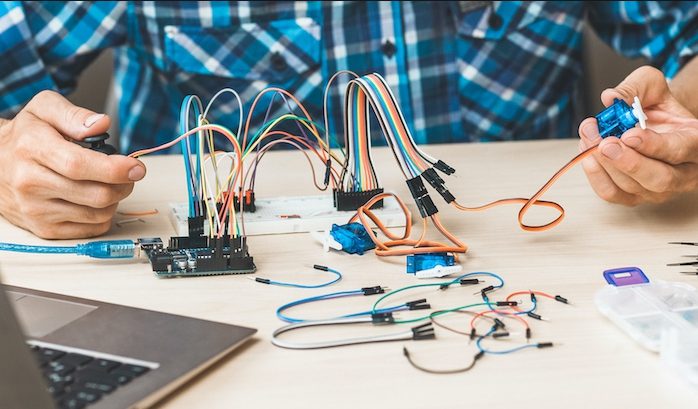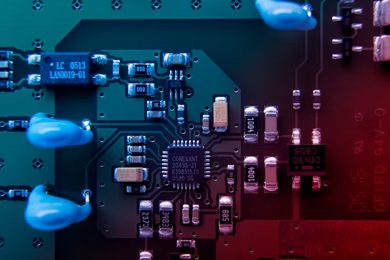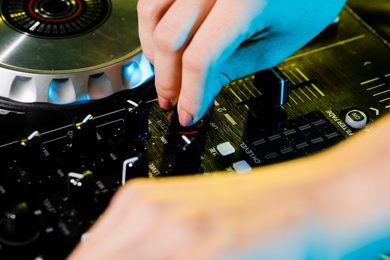This plan includes
- Limited free courses access
- Play & Pause Course Videos
- Video Recorded Lectures
- Learn on Mobile/PC/Tablet
- Quizzes and Real Projects
- Lifetime Course Certificate
- Email & Chat Support
What you'll learn?
- Follow a Hardware Troubleshooting Checklist
- Follow a Software Troubleshooting Checklist
- What are the right tools for troubleshooting
- What are the things to look for when you have a problem in your project
- Best Practices in Electronics Projects Troubleshooting
- Learn how to use different tools to easily investigate problems in electronic Projects and devices
- Get Electronics Troubleshooting Book to know how to test each electronic Component
- Learn how to test electronic components Practically
- Understand the concepts of voltage, resistance and current
- Understand the VOLT OHM Meter/ Digital Multi Meter and how to use safely
- Use Ohm's Law to calculate voltage, current and resistance
- Use resistors in various configurations
- Understand and use capacitors
- Understand and use diodes
- Understand and use a transistor
Course Overview
Pre-requisites
- A multimeter
- A breadboard, jumper wires and a battery
- Resistors, capacitors, LEDs, diodes, transistors, voltage regulators
Target Audience
- Anyone with a need to brush up their knowledge of basic electronics
Curriculum 60 Lectures 04:50:50
Section 1 : Section 1
- Lecture 2 :
- Who We Are
- Lecture 3 :
- Troubleshoot Your Breadboard
- Lecture 4 :
- Debug Your Code
- Lecture 5 :
- Check the Specifications
Section 2 : Section 2
- Lecture 1 :
- Useful tools for troubleshooting
- Lecture 2 :
- Checklist for Hardware
- Lecture 3 :
- Checklist for Software
- Lecture 4 :
- Becoming a Troubleshooter
- Lecture 5 :
- Tools Needed
Section 3 : Section 3
- Lecture 1 :
- Multimeters
- Lecture 2 :
- Wire Cutter and Stripper
- Lecture 3 :
- Wiring Tools Soldering Iron
- Lecture 4 :
- Screw Drivers
- Lecture 5 :
- Pliers
Section 4 : Section 4
- Lecture 1 :
- Wrench
- Lecture 2 :
- Oscilloscope and Function Generator
- Lecture 3 :
- Passive Electronic Components
- Lecture 4 :
- Active Electronic Component Diode
- Lecture 5 :
- Active Electronic Component Transistor
Section 5 : Section 5
- Lecture 1 :
- Common Electronic and Electrical Components
- Lecture 2 :
- Testing A Bulb or Lamp
- Lecture 3 :
- Testing a Switch
- Lecture 4 :
- Testing A Transformer
- Lecture 5 :
- Testing A Resistance
Section 6 : Section 6
- Lecture 1 :
- Safety Concerns
- Lecture 2 :
- Main Concerns Maintenance
- Lecture 3 :
- Main Concerns Servicing
- Lecture 4 :
- Troubleshooting Part1
- Lecture 5 :
- Troubleshooting Part2
Section 7 : Section 7
- Lecture 1 :
- Voltage Current and Resistance
- Lecture 2 :
- Types of Current
- Lecture 3 :
- Types of Circuits
- Lecture 4 :
- Practical Introduction to Digital Multi-meter DMM
- Lecture 5 :
- Volt Ohm Meter Basics
Section 8 : Section 8
- Lecture 1 :
- Measuring Voltage
- Lecture 2 :
- Practical How to Measure DC Voltage
- Lecture 3 :
- Measuring Current
- Lecture 4 :
- Measuring Currents - Lab Experiement Explained
- Lecture 5 :
- Practical 1 How to Measure Current
Section 9 : Section 9
- Lecture 1 :
- Practical 2 How to Measure Current
- Lecture 2 :
- Practical How to test Resistors
- Lecture 3 :
- Circuit Diagram Basics and Basic Symbols
- Lecture 4 :
- Introduction To Resistor and Color Band Coding
- Lecture 5 :
- Measuring Resistance
Section 10 : Section 10
- Lecture 1 :
- Power Dissipation + Parallel and Series Resistors
- Lecture 2 :
- Ohms Law
- Lecture 3 :
- Introduction To Capacitors
- Lecture 4 :
- Capacitors Behavior + Capacitors in Series and Parllel
- Lecture 5 :
- Practical 1 How to test a capacitor
Section 11 : Section 11
- Lecture 1 :
- Practical 2 How to test A Capacitor
- Lecture 2 :
- Introduction to Inductors
- Lecture 3 :
- Practical How to test and measure Coils
- Lecture 4 :
- Introduction to Diode + Zener Diode and LED
- Lecture 5 :
- Practical 1 How to test a Diode
Section 12 : Section 12
- Lecture 1 :
- Practical 2 How to test a Diode
- Lecture 2 :
- Introduction to Transistors
- Lecture 3 :
- Practical 1 How to test a transistor
- Lecture 4 :
- Practical 2 How to test a transistor
- Lecture 5 :
- Practical 3 How to test a transistor
Our learners work at
Frequently Asked Questions
How do i access the course after purchase?
It's simple. When you sign up, you'll immediately have unlimited viewing of thousands of expert courses, paths to guide your learning, tools to measure your skills and hands-on resources like exercise files. There’s no limit on what you can learn and you can cancel at any time.Are these video based online self-learning courses?
Yes. All of the courses comes with online video based lectures created by certified instructors. Instructors have crafted these courses with a blend of high quality interactive videos, lectures, quizzes & real world projects to give you an indepth knowledge about the topic.Can i play & pause the course as per my convenience?
Yes absolutely & thats one of the advantage of self-paced courses. You can anytime pause or resume the course & come back & forth from one lecture to another lecture, play the videos mulitple times & so on.How do i contact the instructor for any doubts or questions?
Most of these courses have general questions & answers already covered within the course lectures. However, if you need any further help from the instructor, you can use the inbuilt Chat with Instructor option to send a message to an instructor & they will reply you within 24 hours. You can ask as many questions as you want.Do i need a pc to access the course or can i do it on mobile & tablet as well?
Brilliant question? Isn't it? You can access the courses on any device like PC, Mobile, Tablet & even on a smart tv. For mobile & a tablet you can download the Learnfly android or an iOS app. If mobile app is not available in your country, you can access the course directly by visting our website, its fully mobile friendly.Do i get any certificate for the courses?
Yes. Once you complete any course on our platform along with provided assessments by the instructor, you will be eligble to get certificate of course completion.
For how long can i access my course on the platform?
You require an active subscription to access courses on our platform. If your subscription is active, you can access any course on our platform with no restrictions.Is there any free trial?
Currently, we do not offer any free trial.Can i cancel anytime?
Yes, you can cancel your subscription at any time. Your subscription will auto-renew until you cancel, but why would you want to?
Instructor

12990 Course Views
124 Courses



 Tech & IT
Tech & IT
 Business
Business
 Coding & Developer
Coding & Developer
 Finance & Accounting
Finance & Accounting
 Academics
Academics
 Office Applications
Office Applications
 Art & Design
Art & Design
 Marketing
Marketing
 Health & Wellness
Health & Wellness
 Sounds & Music
Sounds & Music
 Lifestyle
Lifestyle
 Photography
Photography





















